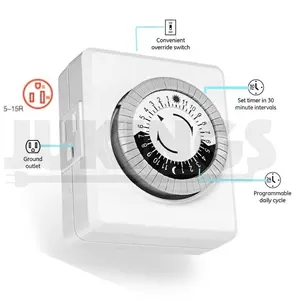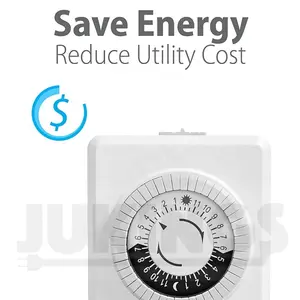
All categories
Featured selections
Trade Assurance
Buyer Central
Help Center
Get the app
Become a supplier

(2293 products available)



















































Electronic game timers are devices designed to keep track of time during various games and activities. They are commonly used in board games, card games, classroom activities, and other competitive events where time limits can enhance gameplay. They help ensure that each player or team adheres to the time limits, promoting fair play and keeping the game flowing. Electronic game timers often come with features like countdown and count-up functions, alarms, and displays to make timing more accessible and engaging.
Board game timers
These are designed specifically for board games. They are suitable for games like chess, checkers, and other strategy games where players take turns. They can be placed on the table for easy access and visibility. Some board game timers are designed to be used in multiple games. They come with customizable settings, allowing users to program specific time limits for each game.
Game timers for classrooms
Classroom timers are used in educational settings to manage time during classroom activities, quizzes, and tests. They help teachers keep track of time and encourage students to complete their tasks within the allotted time. Some game timers for classrooms have features like alarms and backlighting to enhance usability.
Digital countdown timer
Digital countdown timers are versatile devices that can be used in various games and activities. They are suitable for sports, board games, and classroom activities. They are easy to read and use, making them ideal for both competitive and non-competitive scenarios.
Chess timers
Chess timers are specialized electronic timers designed specifically for chess and similar strategy board games. They help manage time during matches, adding a layer of excitement and challenge. There are two main types of chess timers: digital chess clocks and mechanical chess clocks.
Digital chess clocks have a digital display showing the remaining time for each player in minutes and seconds. Players press the clock to switch the time to their opponent. They come in various designs and styles to suit different preferences.
Mechanical chess clocks use gears and levers to measure time. They provide a tactile experience preferred by some traditionalist players. Mechanical clocks are durable and do not require batteries.
The design of electronic game timers incorporates various elements such as aesthetics, ergonomics, and functionality to create a product that meets the needs of users.
Aesthetics
The electronic game timer has an attractive look that draws attention and makes people want to play games. It is usually designed with bright colors or interesting patterns that go well with the game environment. For example, if the timer is for a board game, it might have fancy designs that match the style of board games. If it is for video games, it could have sleek and modern looks that fit into gaming consoles or computers. The appearance of the electronic game timer makes it pleasing to the eyes and adds to its fun and engaging design.
Ergonomics
Ergonomics is about making things comfortable and easy to use. Electronic game timers are designed so players can use them without any problems. They are shaped nicely and have buttons that are easy to press, so people do not get tired even after using them for a long time. The display screen on the timer shows clear numbers that can be seen from far away, making it simple for everyone involved in the game to know how much time is left or passed. This way, no one has to strain themselves just to see what is happening on the timer.
Functionality
The electronic game timer is functional because it works well for its purpose. It performs different functions related to keeping track of time during games. Users can set the desired game time, and the timer counts down or up accordingly. Some timers also offer features like stopping, restarting, or adding extra time (often called a 'bonus') when needed. The timer produces sounds or alerts through beeps or buzzers to signal the end of the game or when time limits are reached. This ensures that players are notified without having to constantly check the timer themselves.
Electronic game timers are flexible tools that can be used in many situations. They help keep track of time and make sure things run smoothly. In competitive gaming, such as chess, electronic game timers are crucial. Players take turns, and the timer records how long each player takes. This is essential in chess tournaments, where every second counts. Similarly, in board game competitions, timers are used to enforce time limits for each player's move or for each round, adding pressure and excitement to the game.
In classrooms, teachers use electronic game timers to manage time during lessons and for educational games. They can set timers for different activities or for students' turns in games, promoting quick thinking and keeping the class on schedule. The use of timers in classrooms is especially beneficial in teaching math and language skills, where every second can make a difference in learning outcomes.
Electronic game timers are also popular in training sessions and team-building activities. Companies use these timers to add a competitive element to training games, ensuring that employees are time-conscious and making the training more engaging. In a corporate setting, the timer can be used to limit presentations during a game-based workshop, ensuring that all participants have equal time to present their ideas.
Additionally, electronic game timers find use in sports settings. Coaches use timers to monitor practice drills, setting time limits for players to complete tasks. Referees in sports games use timers to manage game time and penalties, ensuring fair play. In fitness training, timers are used to limit exercise intervals or rest periods, helping individuals maintain a structured workout routine.
Purpose and Usage:
When choosing an electronic game timer, consider the purpose and usage of the timer. Will it be used for board games, classroom activities, or sports? Understanding the context in which the timer will be used will help determine what features are necessary.
Clear Display:
It is important to choose a timer with a clear and easy-to-read display. During intense gaming sessions or fast-paced activities, users should be able to see the countdown or elapsed time at a glance. Look for timers with large digits and high-contrast displays to ensure visibility from a distance.
Durability and Build Quality:
Electronic game timers should be durable enough to withstand the rigors of gaming sessions. Consider the construction materials and overall build quality of the timer. If the timer will be used in a classroom or sporting events, where it may be subject to rough handling, opt for a timer that is sturdy and can withstand occasional bumps and drops.
Volume Control and Sound Options:
Electronic game timers usually have sound alerts to indicate the end of a countdown or the expiration of a time period. Depending on the environment in which the timer will be used, the volume control and sound options may need to be considered. Choose a timer that allows users to adjust the volume or mute the sounds if necessary.
Power Source:
Consider the power source of the electronic game timer. Some timers operate on batteries, while others have plug-in or rechargeable options. Battery-operated timers offer portability, allowing users to use them anywhere without needing an electrical outlet. On the other hand, plug-in or rechargeable timers may be more convenient for extended use at a fixed location.
Q1: Why are electronic game timers preferred over traditional timers?
A1: Electronic game timers are preferred because they offer precision, flexibility, and interactive features that enhance gameplay and ensure fair competition.
Q2: How do electronic game timers improve gameplay?
A2: Electronic game timers improve gameplay by providing automated timekeeping, customizable time settings, and various timing modes.
Q3: What are the advantages of using electronic game timers?
A3: The advantages of using electronic game timers include accuracy, ease of use, flexibility, and enhanced features compared to traditional timers.
Q4: What features should be considered when choosing an electronic game timer?
A4: Features to consider when choosing an electronic game timer include display type, power source, volume control, and durability.
Q5: Where can one buy electronic game timers?
A5: One can buy electronic game timers from Alibaba.com, where various suppliers offer different electronic game timers.